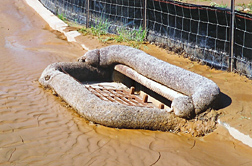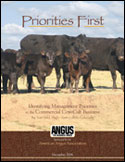'Super Socks' Help Stem
Pollution Runoff
Agricultural Research Service (ARS) scientists and their collaborators have improved on an existing method for removing contaminants from stormwater runoff. These findings could provide surface waters additional protection against runoff containing pollutants from point sources such as construction sites, stormwaters and other urban landscapes.
"Filter socks" containing compost tucked into mesh tubes are used to capture some of the silt, heavy metals, fertilizers and petroleum products washed from compacted surface areas into nearby streams and rivers.

ARS scientists and their collaborators found a way to improve the ability of compost filled mesh tubes called filter socks to remove silt, heavy metals, fertilizers and petroleum products from stormwater runoff by adding flocculation agents. Photo courtesy of Filtrexx International.
A group of scientists from the ARS Animal and Natural Resources Institute in Beltsville, Md., teamed with researchers from Filtrexx International, which manufactures the socks, to see if adding flocculation agents to the socks improved their performance. The ARS team included agronomist Eton Codling, microbiologist Dan Shelton and soil scientists Yakov Pachepsky and Ali Sadeghi. Their Filtrexx International partners were Britt Faucette and Fatima Cardoso-Gendreau.
Wastewater treatment plants use flocculation agents to help sediments and pollutants form clumps large enough to be filtered out of the water, even when the substances are in a dissolved state. The team added flocculation agents to compost socks and then ran laboratory tests to see how well the socks trapped sediment, coliforms, nitrates, E. coli bacteria, heavy metals and petroleum products in runoff after simulated "rain events."
The scientists found that compost socks alone removed the majority of clay and silt particles that contribute to suspended solids in surface waters. The socks also removed 17% of ammonium nitrogen, 75% of E. coli bacteria, and from 37% to 72% of the heavy metals. In addition, runoff levels of diesel fuel dropped 99%, levels of motor oil dropped 84%, and gasoline levels dropped 43%.
 However, socks with flocculation agents removed even more of the pollutants from runoff, including 27% of the ammonium nitrogen, 99% of E. coli bacteria, 99% of the motor oil, 54% of the gasoline and from 47% to 74% of the heavy metals.
However, socks with flocculation agents removed even more of the pollutants from runoff, including 27% of the ammonium nitrogen, 99% of E. coli bacteria, 99% of the motor oil, 54% of the gasoline and from 47% to 74% of the heavy metals.
Results from this research were published in the Journal of Environmental Quality.




